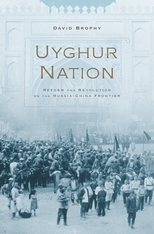Uyghur Nation: Reform and Revolution on the Russia-China Frontier
Posted: April 27th, 2016 | No Comments »David Brophy’s Uyghur Nation adds to the growing shelf of Turkestan studies…all that helps to improve understanding and raise awareness of issues in the region is, of course, helpful….
The meeting of the Russian and Qing empires in the nineteenth century had dramatic consequences for Central Asia’s Muslim communities. Along this frontier, a new political space emerged, shaped by competing imperial and spiritual loyalties, cross-border economic and social ties, and the revolutions that engulfed Russia and China in the early twentieth century. David Brophy explores how a community of Central Asian Muslims responded to these historic changes by reinventing themselves as the modern Uyghur nation. A diverse diaspora of Muslims from China’s northwest province of Xinjiang spread to Russian territory and became enmeshed with national and transnational discourses of identity among Russia’s Muslims. In the tumult of the Bolshevik Revolution, the rhetoric of Uyghur nationhood emerged as a rallying point. A shifting alliance of constituencies invoked the idea of a Uyghur nation to secure a place for itself in Soviet Central Asia and to spread the revolution to Xinjiang. Although its existence was contested in the fractious politics of the 1920s, in the 1930s the Uyghur nation achieved official recognition in the Soviet Union and China. Grounded in archives from across Eurasia, Uyghur Nation provides crucial background to the ongoing contest for the history and identity of Xinjiang.

Leave a Reply